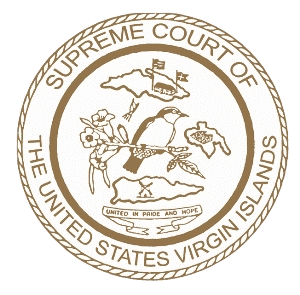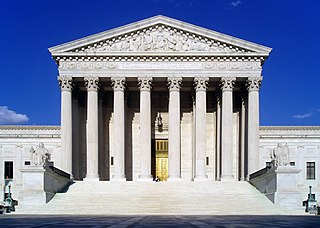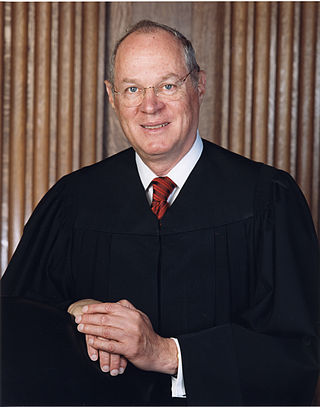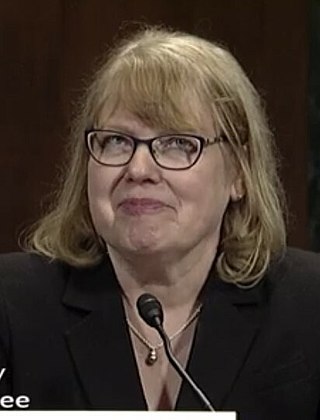
The Supreme Court of the United States (SCOTUS) is the highest court in the federal judiciary of the United States. It has ultimate appellate jurisdiction over all U.S. federal court cases, and over state court cases that turn on questions of U.S. constitutional or federal law. It also has original jurisdiction over a narrow range of cases, specifically "all Cases affecting Ambassadors, other public Ministers and Consuls, and those in which a State shall be Party." The court holds the power of judicial review, the ability to invalidate a statute for violating a provision of the Constitution. It is also able to strike down presidential directives for violating either the Constitution or statutory law.

The chief justice of the United States is the chief judge of the Supreme Court of the United States and is the highest-ranking officer of the U.S. federal judiciary. Article II, Section 2, Clause 2 of the U.S. Constitution grants plenary power to the president of the United States to nominate, and, with the advice and consent of the United States Senate, appoint "Judges of the supreme Court", who serve until they die, resign, retire, or are impeached and convicted. The existence of a chief justice is only explicit in Article I, Section 3, Clause 6 which states that the chief justice shall preside over the impeachment trial of the president; this has occurred three times, for Andrew Johnson, Bill Clinton, and for Donald Trump’s first impeachment.

The judiciary is the system of courts that adjudicates legal disputes/disagreements and interprets, defends, and applies the law in legal cases.

The federal government of the United States is the national government of the United States, a federal republic located primarily in North America, composed of 50 states, five major self-governing territories, several island possessions, and the federal district of Washington, D.C., where most of the federal government is based.

Warren Earl Burger was an American attorney and jurist who served as the 15th chief justice of the United States from 1969 to 1986. Born in Saint Paul, Minnesota, Burger graduated from the St. Paul College of Law in 1931. He helped secure the Minnesota delegation's support for Dwight D. Eisenhower at the 1952 Republican National Convention. After Eisenhower won the 1952 presidential election, he appointed Burger to the position of Assistant Attorney General in charge of the Civil Division. In 1956, Eisenhower appointed Burger to the United States Court of Appeals for the District of Columbia Circuit. Burger served on this court until 1969 and became known as a critic of the Warren Court.
The chief justice is the presiding member of a supreme court in many countries with a justice system based on English common law, such as the High Court of Australia, the Supreme Court of Canada, the Supreme Court of Ghana, the Court of Final Appeal of Hong Kong, the Supreme Court of India, the Supreme Court of Ireland, the Supreme Court of Japan, the Supreme Court of Nepal, the Supreme Court of New Zealand, the Supreme Court of Nigeria, the Supreme Court of Pakistan, the Supreme Court of the Philippines, the Supreme Court of Singapore, the Supreme Court of the United States, and provincial or state supreme courts/high courts.

The Supreme Court (Filipino: Kataas-taasang Hukuman; colloquially referred to as the Korte Suprema, is the highest court in the Philippines. The Supreme Court was established by the Second Philippine Commission on June 11, 1901 through the enactment of its Act No. 136, an Act which abolished the Real Audiencia de Manila, the predecessor of the Supreme Court.

The Supreme Court of the United Kingdom is the final court of appeal in the United Kingdom for all civil cases, and for criminal cases originating in England, Wales and Northern Ireland. As the United Kingdom's highest appellate court for these matters, it hears cases of the greatest public or constitutional importance affecting the whole population.

The demographics of the Supreme Court of the United States encompass the gender, ethnicity, and religious, geographic, and economic backgrounds of the 116 people who have been appointed and confirmed as justices to the Supreme Court. Some of these characteristics have been raised as an issue since the court was established in 1789. For its first 180 years, justices were almost always white male Protestants of Anglo or Northwestern European descent.

The Supreme Court of the Virgin Islands is the highest court in the territory of the United States Virgin Islands. The Supreme Court assumed jurisdiction over all appeals from the Superior Court of the Virgin Islands, a trial level court, on January 29, 2007. The Supreme Court currently consists of a Chief Justice and three associate justices, but up to four associate justices may be appointed. Supreme Court justices are each appointed by the Governor and confirmed by the Legislature for a ten-year term. There is no intermediate court of appeals, and the Supreme Court does not have discretion in hearing appeals. Appeals of Supreme Court decisions were heard by writ of certiorari by the United States Court of Appeals for the Third Circuit until December 29, 2012, but since then they have been heard by the Supreme Court of the United States in Washington, DC.

William Hubbs Rehnquist was an American attorney and jurist who served as the 16th chief justice of the United States from 1986 until his death in 2005, having previously been an associate justice from 1972 to 1986. Considered a staunch conservative, Rehnquist favored a conception of federalism that emphasized the Tenth Amendment's reservation of powers to the states. Under this view of federalism, the Court, for the first time since the 1930s, struck down an act of Congress as exceeding its power under the Commerce Clause.

President Barack Obama made two successful appointments to the Supreme Court of the United States. The first was Judge Sonia Sotomayor to fill the vacancy created by the retirement of Justice David H. Souter. Sotomayor was confirmed by the United States Senate on August 6, 2009, by a vote of 68–31. The second appointment was that of Solicitor General Elena Kagan to replace the retired John Paul Stevens. Kagan was confirmed by the Senate on August 5, 2010, by a vote of 63–37.

Willis Van Devanter was an American lawyer who served as an associate justice of the Supreme Court of the United States from 1911 to 1937. He was a staunch conservative and was regarded as a part of the Four Horsemen, the conservative bloc which dominated the Supreme Court during the 1930s.

Anthony McLeod Kennedy is an American attorney and jurist who served as an associate justice of the Supreme Court of the United States from 1988 until his retirement in 2018. He was nominated to the court in 1987 by President Ronald Reagan, and sworn in on February 18, 1988. After the retirement of Sandra Day O'Connor in 2006, he was considered the swing vote on many of the Roberts Court's 5–4 decisions.

James Clark McReynolds was an American lawyer and judge from Tennessee who served as United States Attorney General under President Woodrow Wilson and as an associate justice of the Supreme Court of the United States. He served on the Court from 1914 to his retirement in 1941. McReynolds is best known today for his sustained opposition to the domestic programs of President Franklin D. Roosevelt and his personality, which was widely viewed negatively and included documented elements of overt antisemitism and racism.

Ketanji Onyika Brown Jackson is an American lawyer and jurist who is an associate justice of the Supreme Court of the United States. Jackson was nominated to the Supreme Court by President Joe Biden on February 25, 2022, and confirmed by the U.S. Senate and sworn into office that same year. She is the first black woman and the first former federal public defender to serve on the Supreme Court.
Holder v. Humanitarian Law Project, 561 U.S. 1 (2010), was a case decided in June 2010 by the Supreme Court of the United States regarding the Patriot Act's prohibition on providing material support to foreign terrorist organizations. The case, petitioned by United States Attorney General Eric Holder, represents one of only two times in First Amendment jurisprudence that a restriction on political speech has overcome strict scrutiny. The other is Williams-Yulee v. Florida Bar.

Allison Lynn Hartwell Eid is a United States circuit judge of the United States Court of Appeals for the Tenth Circuit. She previously served as an associate justice of the Colorado Supreme Court.
With the advice and consent of the United States Senate, the president of the United States appoints the members of the Supreme Court of the United States, which is the highest court of the federal judiciary of the United States. Following his victory in the 2016 presidential election, Republican Donald Trump took office as president on January 20, 2017, and faced an immediate vacancy on the Supreme Court due to the February 2016 death of Associate Justice Antonin Scalia.